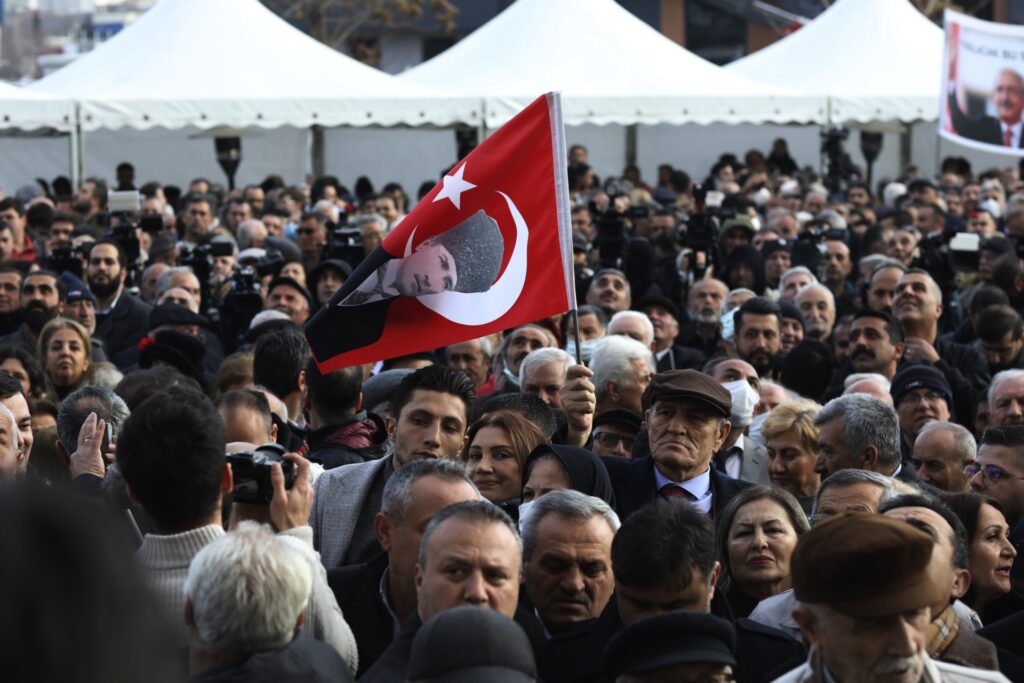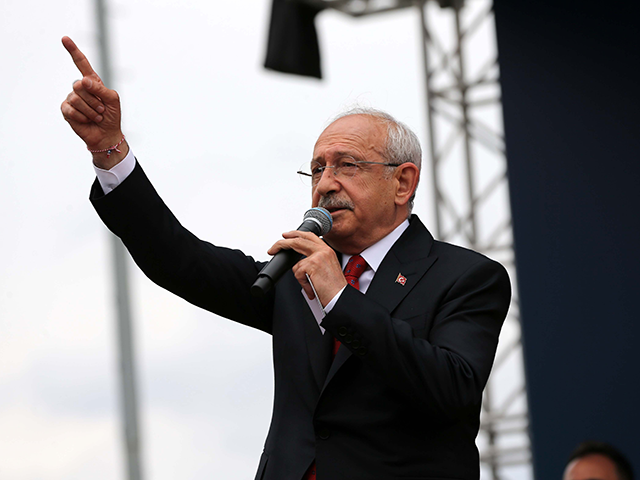The top opposition candidate in Sunday’s Turkish presidential election, Kemal Kılıçdaroğlu, accused the Russian government on Thursday of disseminating “deepfake content” and other disinformation to meddle in the election.
The allegation followed similar claims by Islamist President Recep Tayyip Erdoğan that the United States and the greater “West” was attempting to influence the outcome of the election.

A man holding a flag with an image of Turkey’s founder Mustafa Kemal Ataturk waits with others as Kemal Kılıçdaroğlu, the leader of the pro-secular, center-left Republican People’s Party, or CHP, is nominated by a six-party alliance as its common candidate to challenge President Recep Tayyip Erdogan, in Ankara, Turkey, March 6, 2023. (AP Photo/Burhan Ozbilici)
“Dear Russian friends, you are behind the fabrications, conspiracies, deepfake content and tapes exposed in this country yesterday,” Kılıçdaroğlu, of the secularist Republican People’s Party (CHP), wrote in a message on Twitter Thursday. “If you want the continuation of our friendship after May 15, take your hands off the Turkish state.”
“We are still in favor of cooperation and friendship,” he added toward the end.
Sevgili Rus Dostlarımız,
Dün bu ülkede ortaya saçılan montajlar, kumpaslar, Deep Fake içerikler, kasetlerin arkasında siz varsınız. Eğer 15 Mayıs sonrası dostluğumuzun devamını istiyorsanız, elinizi Türk’ün devletinden çekin. Biz hala işbirlikten ve dostluktan yanayız.— Kemal Kılıçdaroğlu (@kilicdarogluk) May 11, 2023
In his reference to “deepfake content” allegedly exposed this week, Kılıçdaroğlu appeared to be addressing allegations by former presidential candidate Muharrem İnce that unknown individuals had begun spreading an Israeli pornographic video online featuring doctored images including him. İnce dropped out of the race in a dramatic press conference condemning Turkish politics in general.
“I was a member of parliament for five terms. I have been fighting in politics for over 40 years. What I have seen in the last 45 days, I have not seen in the last 45 years,” İnce railed, according to the secularist newspaper Cumhuriyet. “Fake receipts, fake images … they cut an image from an Israeli porn site, cut off my head and put it on there.”
Prior to founding the Homeland Party, which he ran as a candidate of, İnce was a longtime member of the CHP, meaning his small slice of the vote – between two to six percent, according to various recent polls – will likely go to Kılıçdaroğlu.
İnce reportedly blamed supporters of Pennsylvania cleric Fethullah Gülen, a longtime opponent of Erdoğan’s that the president blames for the alleged failed coup against him in 2016, for the alleged fabrications.
Kılıçdaroğlu said Russia was behind the sex tape scandal that led to İnce’s withdrawal from election. He warned Russia not to interfere with Turkish domestic affairs and said “If you want our friendship after May 15, take off your hands from Turk’s state.” https://t.co/m6kwVLyAT2
— Duvar English (@DuvarEnglish) May 12, 2023
The Kremlin reacted with outrage to Kılıçdaroğlu’s message.
“We strongly reject such statements,” top Russian presidential spokesman Dmitry Peskov said on Friday. “We officially declare: there can be no talk of any interference … If someone provided Mr. Kılıçdaroğlu with such information, they are liars.”
Turkey is a NATO member country with a long history of friendly ties to Western Europe and the United States. Under the Islamist Erdoğan government, however, Turkey has become increasingly friendly to Moscow, going so far as breaking NATO protocol by buying Russian weapons that are not interoperable with NATO technology.
Following the CHP accusations, Erdoğan’s Islamist Justice and Development Party (AKP) countered by accusing Washington of interfering in the presidential election.
“America has been interfering with this election from the very beginning,” Interior Minister Süleyman Soylu said on Friday, according to the Turkish newspaper Hurriyet. Soylu appeared to blame Washington for İnce dropping out, a move widely believed to improve the CHP’s chances.
“The [U.S.’] basic logic is ‘If İnce was the former CHP candidate, we would get the votes that went to him,'” he alleged.
Neither side has provided the public with proof of either Russian or American election interference. Erdoğan appeared to describe general coverage of the election in Western media as “interference” inherently in remarks on Friday.
“What do all the magazines say on their covers? ‘Erdoğan must go.’ (Those published) in Germany, France and England say so. What is it to you?” the president said at a public event, according to the state-run Turkish Anadolu Agency. “How do you put these words on the covers of these magazines? It’s not you, the West! It’s my nation to decide on it.”
Erdoğan appeared to be referring to the cover of the British magazine The Economist, which branded the Turkish presidential race “the most important election of 2023.”
The Economist cover this week is featuring Turkey’s elections.
“The Most Important Election of 2023” pic.twitter.com/OBsTsqbuc1
— Ragıp Soylu (@ragipsoylu) May 4, 2023
Erdoğan also addressed Kılıçdaroğlu’s accusations against Russia, apparently accusing him of being a Western agent.
“(Kilicdaroglu said) Russia is manipulating the elections in Türkiye. Shame on you!” the president said. “If I say ‘America is manipulating the elections in Türkiye, Germany is manipulating it, France is manipulating it, England is manipulating it’, what would you (Kilicdaroglu) say? … How many times have you come together with them? How do you know them?”
Polls show Erdoğan facing the toughest challenge to his political dominance since becoming prime minister two decades ago, as Kılıçdaroğlu has managed to unite most of the opposition and dissuade the few parties that did not join his coalition from running their own candidates, splitting the anti-Erdoğan vote.
The Turkish pollster Konda found Kılıçdaroğlu receiving 49.3 percent of the vote on Thursday compared to Erdoğan’s 43.7 percent, a somewhat larger lead than the challenger had enjoyed in prior polls. Konda’s survey was taken before İnce dropped out, however, meaning the small margin of voters supporting the Homeland Party were not counted properly.
To win the Turkish presidential election in one round, a candidate must receive over 50 percent of the vote. If no candidate does so, the top two candidates go on to a run-off vote, scheduled if necessary this year for May 28.
“The possibility of Kemal Kilicdaroglu winning has increased with Ince’s withdrawal. I would not be surprised if he got 51%,” the manager of Konda, Bekir Agirdir, said this week, according to Reuters.
The Turkish election is widely expected to not be a free and fair vote given widespread AKP mob violence against the opposition, Erdoğan’s destruction of Turkey’s free press (“there are not as many journalists … in prisons as it has been claimed,” Erdoğan insisted on Thursday), and suspicions of potential election interference. The state-run Supreme Election Council (YSK), the agency that administers elections in Turkey, insisted this week, however, that it is prepared to protect the integrity of the vote.
“All measures and precautions with regards to our technological infrastructure and against possible power cuts and cyberattacks have been taken, and necessary trial tests have been carried out,” YSK Chairman Ahmet Yener told Anadolu Agency.

COMMENTS
Please let us know if you're having issues with commenting.